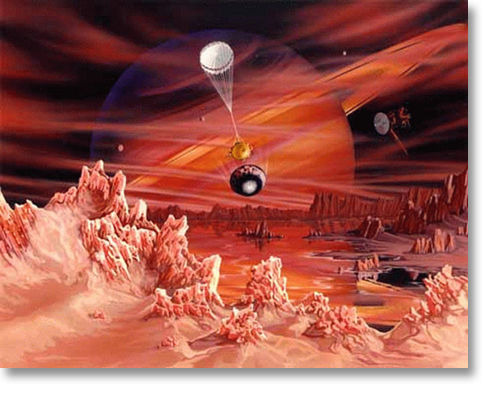Implications for Exobiology on Titan
What appeals most to scientists about Titan is its large abundance of hydrocarbons and organic molecules in its atmosphere, unlike any other planetary body in the solar system. These molecules form in the Titan atmosphere, and are expected to rain down on to the cold Titan surface producing a significant layer of organic debris. Just following a major impact event, local, but very significant warming can occur, releasing liquid water (either melting is locally or releasing it from a possible liquid state below). But would there be time for life to be created on the surface, in this very short-lived, warm, organic soup? Probably not. Subsurface ocean life might also be quite unlikely.
Can we test for possible biological activity?
Recall, terrestrial organisms preferentially enrich 12CO
over 13CO, so we might expect to see evidence of
isotopic fractionation in Titan's atmosphere.

Recreating the pre-biotic Earth
What is perhaps the greatest driving force for a close up
study of Titan is its unique atmosphere.
Scientists believe conditions may be created on Titan which are
similar to those on the primordial Earth, when terrestrial life
originated: liquid water, a heavily reducing atmosphere of methane,
ammonia and nitrogen, and an abundance of complex organic molecules.
Understanding the chemical reactions on Titan and their chemical
byproducts will be of substantial benefit to understanding the
early Earth, possibly helping us to understand the processes that
occurred on the Earth and led to the formation of life here.